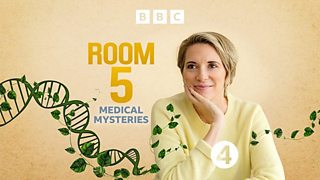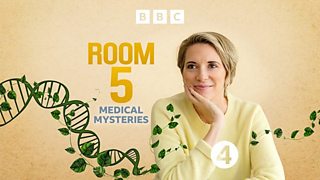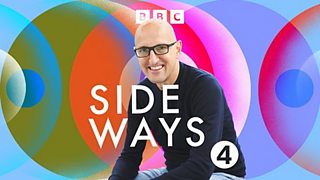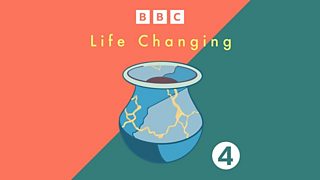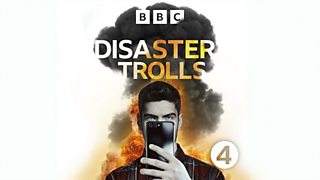Holly Smale: "I was diagnosed as autistic at 39"
Holly Smale was a successful author – the creator of the bestselling series of children’s books, Geek Girl. On paper, her life was good. So why did she feel broken? Then, aged 39, she finally got a diagnosis: Holly was autistic.
In Room 5 – the series about lifechanging diagnosis – Helena Merriman speaks to Holly about her difficult childhood, short-lived modelling career, traumatic university years – and the day it suddenly all made sense.
“I burst into tears saying, I am broken”
One afternoon, Holly sat with her therapist. She was at rock bottom.
“I burst into tears saying, 'I am broken. There’s something wrong with me and I need you to work out what it is',” Holly recalls. “I just thought that I wasn’t a worthwhile human. And I genuinely thought that I would never be fixed.”
And so, they began to track back through Holly’s life – in a quest for answers.
“I remember just thinking, I’m not like them”
Holly was at nursery when she first realised she was different.
“I remember sitting in a dark corner of the nursery, facing a wall, and I looked up and looked out of the window,” says Holly. “All of the children were outside… and I remember just thinking, 'huh, I’m not like them.'”
Holly sits and reads when the other kids play. She’s engrossed in her own world; doesn’t join in with their games. This continues all through nursery and then into primary school.
Holly remembers sitting on a bench in the playground with kids playing around her. “It was all overwhelming,” she says. “Everything was so loud and so bright and so much.” Rather than joining in, she knits pom poms.
“Shame was starting to set in,” says Holly. “The first tingles of, hang on, there’s something wrong with me. An isolation and realising the difference was going to be a problem.”
“I’d worked out very early that I had to people watch, because I genuinely thought I was an alien. That I’d been dropped off on the planet, no manual attached,” says Holly.
“I’d watch how close they stood to each other when they were having a conversation. I’d listen to how their voices went up and down. I would look at the facial expressions they would pull.”
“And I remember going over to groups of people and monologuing at them about my dinosaur facts or my box full of rocks that I collected.”
And yet, despite all her studying, the other children still didn’t invite her to play. “They just stayed away from me.”
Holly finds escapism in books
And so, Holly turns to books. And as she reads, everything hard that happens at school falls away.

“It is sheer escapism,” says Holly. “I’m not myself anymore, I’m wherever the story is taking me. I read as many books as I could get my hands on. I was completely obsessed.”
And she starts writing too. Short stories at first, and then poems.
And then, aged 11, it’s time for a new start: secondary school.
Holly did everything she could to fit in. But the other kids would tell her she spoke “funny”. “And then it just got nastier and nastier,” says Holly. “People waiting for me outside school so they could follow me down the road and shout things at me. It just got to a point where I was scared all the time.”
One day, she’s chased down the corridor. She runs because she has a feeling she’s had before and she knows, soon, she’ll lose control.
“My body basically becomes incredibly painful and everything starts to flash”
Holly hides under a pile of coats in the changing room and, then, it begins: a meltdown.
“My body basically becomes incredibly painful and everything starts to flash. Everything hurts. And things start to go black.”
Holly curls into a ball and shuts her eyes. Streaks of light flash across her closed lids.
“Like fireworks display. Just colours exploding. And it’s frightening, especially when you don’t know what it is. When you think that you’re insane,” she says. “That’s what I basically thought. I thought if I get too emotional, I’m mad. And no one can see that.”
That evening, Holly was exhausted. “I was just like a switched-off robot,” she says. After dinner, she crawls into a small cupboard. “If it was quiet, if it was dark, then that would calm me down.”
Over the next few years, the bullying and meltdowns happen again and again. “So I just shut down,” she says. “Just kind of turned into this complete shell.”
“I thought they might be able to show me how to be normal”
Aged 15, Holly is spotted by a modelling agency who want to sign her.
“I thought, well, they might be able to show me how to be normal. Maybe they can teach me. Maybe they can give me a haircut and put me in nice clothes.”
On her first photoshoot, Holly stands in front of the camera, and it turns out she’s brilliant at it. “I have to remind myself to move my face and show emotion when I’m talking,” says Holly. “And ironically that completely dead expression worked really well for the modelling industry.”
But the hopes that it will normalise her don’t bear fruit. “Actually, I just went from being the geeky girl at school to being the geeky model in the corner.”
“I’ve been sexually assaulted so many times I can’t even count anymore”
Holly’s university years were traumatic too. She couldn’t go to lectures because there were “too many people.” Instead, she would get “really wasted” and go to a club – but stand outside smoking to manage her anxiety.
And then there were the guys. “I was definitely vulnerable,” she states. “I’m either in my own world or I just trust what is being told to me. I’ve been sexually assaulted so many times I can’t even count anymore. Because I can’t see it coming, and I don’t know how to react. I freeze.”
After she leaves the tough times continue. Difficult friendships, unhealthy relationships, until…
“This voice came rushing out of me”
Aged 26, Holly is home for Christmas, sitting at her childhood desk. “This voice came rushing out of me,” she recalls. “The name came to me, and the voice came to me. It was one of those magical moments and I got a tingle all over me and I was like, 'This is the right story for me.'”
Holly writes chapter after chapter about Harriet Manners, a teenage geek who loves facts, makes plans, doesn’t always get jokes and struggles with friends. “She’s essentially me,” says the author.
The resulting book – Geek Girl – is the highest selling children’s book of the year. Holly gets messages from children and parents thanking her for writing it. But one email – from the National Autistic Society – stands out. They ask: does Holly realise that Harriet is autistic?
“I’m like, 'How dare you? No, no she’s not,'” says Holly. “She’s just a really clever girl who can’t handle sensory environments and can’t communicate properly and needs to have everything in order. I had no idea what autism was.”
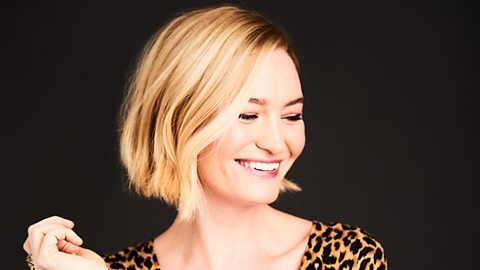
I knew straight away... This is me
How Holly came to accept her autism.
Then finally, a diagnosis
But when an online relationship goes wrong and sends Holly into a “total meltdown” that it takes her days to recover from, she thinks back to that email.
There was grief – years and years of being told there’s something wrong with me
“I started googling, what does autism look like in girls and women? And suddenly all these bells just started going ring, ring, ring,” says Holly. “My god, this is me.”
A few months later, Holly is assessed. The psychologist has no doubt in her mind that Holly is autistic.
“I cried,” says Holly. “There was grief – years and years of being told there’s something wrong with me. There was relief, obviously, because I’ve been searching for an answer my whole life. But it took me a while to reach pride, which is where I’m at now.”
Holly says the decision to go public about her diagnosis wasn’t easy: “The reality is that there is a taboo still.” But she struggled to find examples of famous women who were autistic, and realised opening up herself could really help.
“If I come out as autistic but, more importantly, if Harriet Manners comes out as autistic, then those three and a half million people that read Geek Girl are going to know what it is like to be an autistic girl a little bit better, and for the small proportion of people who read it and are autistic, they’re going to feel like they have someone on their team. They’re not completely alone.”
“It’s helped me to love myself a bit more”
Holly is still writing, as well as educating people on social media about autism. She’s also doing talks in schools to change things for the next generation of autistic girls.
“From an emotional perspective, it’s helped me to love myself a bit more and to feel much less shame,” says Holly. “I’m not fussed anymore about being like everyone else.”
“It feels a bit like growing up thinking you’re a duck and everyone telling you, your entire life, you’re a rubbish duck… And then you suddenly hit the age of 39 and someone says, 'You do realise you’re not a duck, you’re actually a frog?' And you have this moment of revelation where you’re like, of course, it doesn’t matter that I can’t paddle and do all those duck things, because I’m really good at being a frog.”
Holly’s diagnosis gave her what no treatment, pills or surgery could: it took away her shame, and replaced it with pride.
More from Βι¶ΉΤΌΕΔ Radio 4
-
![]()
Room 5
One afternoon, Helena Merriman walked into a doctor's surgery and was given a shock diagnosis.
-
![]()
Sideways
Best-selling author Matthew Syed explores the ideas that shape our lives with stories of seeing the world differently.
-
![]()
Life Changing
Dr Sian Williams talks to people who have lived through extraordinary events that have reshaped their lives in the most unpredictable ways.
-
![]()
Disaster Trolls
What happens when tragedy makes you a target? Βι¶ΉΤΌΕΔ disinformation and social media correspondent Marianna Spring investigates.
